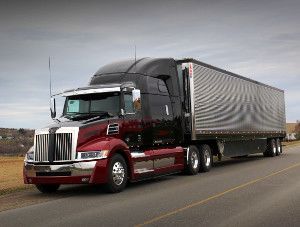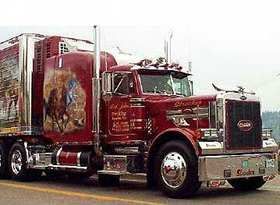Going To CDL School, New To The Industry
Topic 11925 | Page 2

I don't know what I am talking about here, but it would be worth a shot with the industry and new warehouses being built you might be able to land a yard jockey job just shuttling the trailers around at the warehouses.
But, I don't know anything about that and don't know if they consider that running local either.
Rob, you're correct in that you're probably looking at 50-60 hour weeks running most local jobs.
There's one huge concern with your plan, though. Many of those local jobs you're looking at are as tough as they come.
If you're making pickups and deliveries around the city you're in super heavy traffic and highly congested areas all day long. Even worse is the backing you'll have to do up there. You're going to have to get that monster backed in off the streets, around tight corners, blind-side into alleyways, and all kinds of crazy stuff.
There may also be some line haul jobs available where you pull a set of doubles from terminal to terminal and you're home every day. Again, unfortunately, doubles are super dangerous, especially in the winter.
To be honest, I'm floored that any local companies running P & D or pulling doubles would even consider hiring someone straight out of school. To me there's almost no chance you're going to jump on a P & D or line haul gig up in the Northeast and get through that first year without at least a few incidents.
We always highly recommend that people get one year of OTR experience under their belt before trying anything like P & D or line haul. Very few people ever get the opportunity at one of those jobs straight out of school in the first place but for the few we know of it's been a nightmare except for one.
I completely understand not wanting to leave family. I wouldn't want to either. But in my opinion it's just too difficult and dangerous starting out in one of the toughest jobs in the country like that. If you can find a compromise and at least get 3-6 months of OTR before taking a local gig it would make all the difference in the world. It would give you a chance to improve your backing, shifting, and navigating skills before diving head first into more difficult work.
Terminal:
A facility where trucking companies operate out of, or their "home base" if you will. A lot of major companies have multiple terminals around the country which usually consist of the main office building, a drop lot for trailers, and sometimes a repair shop and wash facilities.
OTR:
Over The Road
OTR driving normally means you'll be hauling freight to various customers throughout your company's hauling region. It often entails being gone from home for two to three weeks at a time.
P & D:
Pickup & Delivery
Local drivers that stay around their area, usually within 100 mile radius of a terminal, picking up and delivering loads.
LTL (Less Than Truckload) carriers for instance will have Linehaul drivers and P&D drivers. The P&D drivers will deliver loads locally from the terminal and pick up loads returning to the terminal. Linehaul drivers will then run truckloads from terminal to terminal.
Line Haul:
Linehaul drivers will normally run loads from terminal to terminal for LTL (Less than Truckload) companies.
LTL (Less Than Truckload) carriers will have Linehaul drivers and P&D drivers. The P&D drivers will deliver loads locally from the terminal and pick up loads returning them to the terminal. Linehaul drivers will then run truckloads from terminal to terminal.Doubles:
Refers to pulling two trailers at the same time, otherwise known as "pups" or "pup trailers" because they're only about 28 feet long. However there are some states that allow doubles that are each 48 feet in length.
HOS:
Hours Of Service
HOS refers to the logbook hours of service regulations.
Thanks everyone for the great advice. I'm starting school on Monday and Ill start applying to jobs this week as well. I'm getting a lot of great help from this site and everyone seems very friendly. I look forward to a time when I'll be a contributing member to this site...
- Rob

My advice, for what it's worth, would be to go regional for year if you can. Most of them can get you home most weekends. As it was said before, LTL leaves you so exhausted you don't have time for your family until a weekend off anyways.
Quality time, over quantity time. Plus, you can always take a family member out with you for a week provided the company offers a rider policy, and the family member is old enough. I imagine that would be a great way to bond with your wife and kids while making some pretty unique memories to boot.
My 0.02 cpm.
Regional:
Regional Route
Usually refers to a driver hauling freight within one particular region of the country. You might be in the "Southeast Regional Division" or "Midwest Regional". Regional route drivers often get home on the weekends which is one of the main appeals for this type of route.
LTL:
Less Than Truckload
Refers to carriers that make a lot of smaller pickups and deliveries for multiple customers as opposed to hauling one big load of freight for one customer. This type of hauling is normally done by companies with terminals scattered throughout the country where freight is sorted before being moved on to its destination.
LTL carriers include:
- FedEx Freight
- Con-way
- YRC Freight
- UPS
- Old Dominion
- Estes
- Yellow-Roadway
- ABF Freight
- R+L Carrier
CPM:
Cents Per Mile
Drivers are often paid by the mile and it's given in cents per mile, or cpm.
New Reply:
New! Check out our help videos for a better understanding of our forum features

















Preview:








 TT On Facebook
TT On Facebook
Hey Rob, I know how you feel. I'm a public school teacher and I too get the finger, spit on, cursed, blamed, etc. funny ain't it? You try to protect 'em, and I try to teach 'em. Same result. And I agree...it just gets worse every year. Not what I signed on for either. Trucking seems like a nice alternative to what we're doing; if anything for our health and sanity! just thinking of the job satisfaction of carrying a load from A to B seems to be much more appealing than what we do now. Even the twelve weeks off a year has lost its luster😳